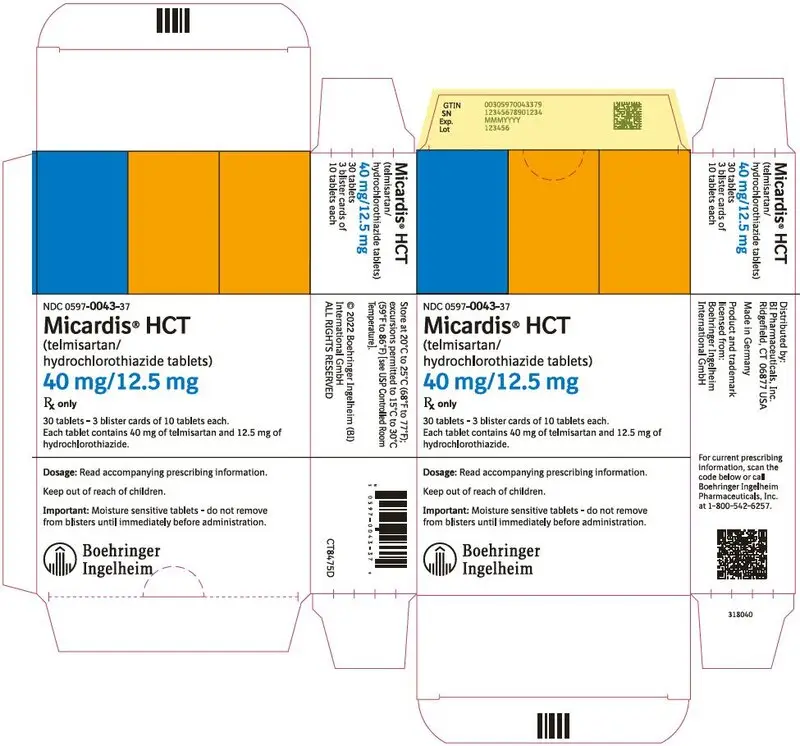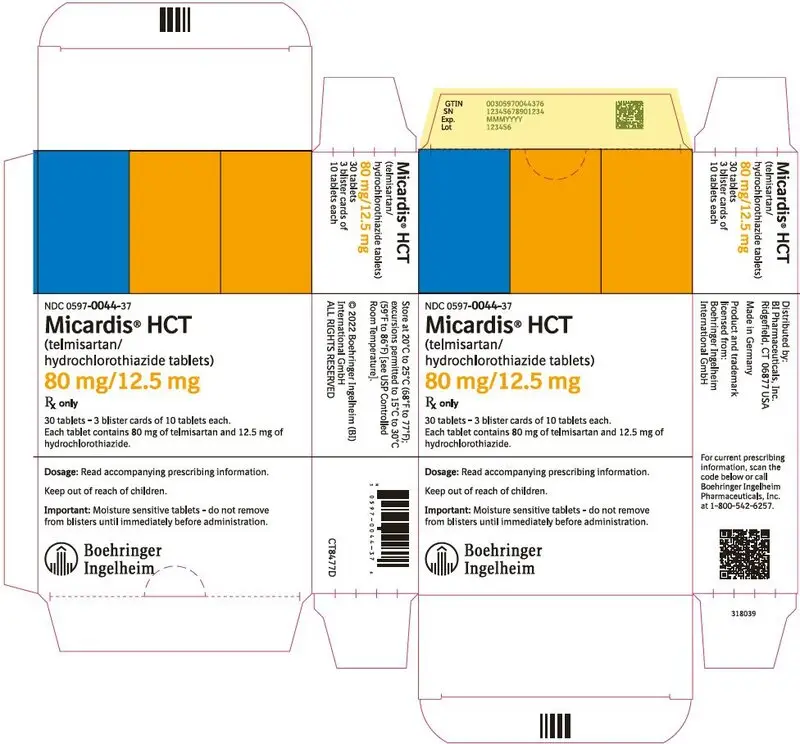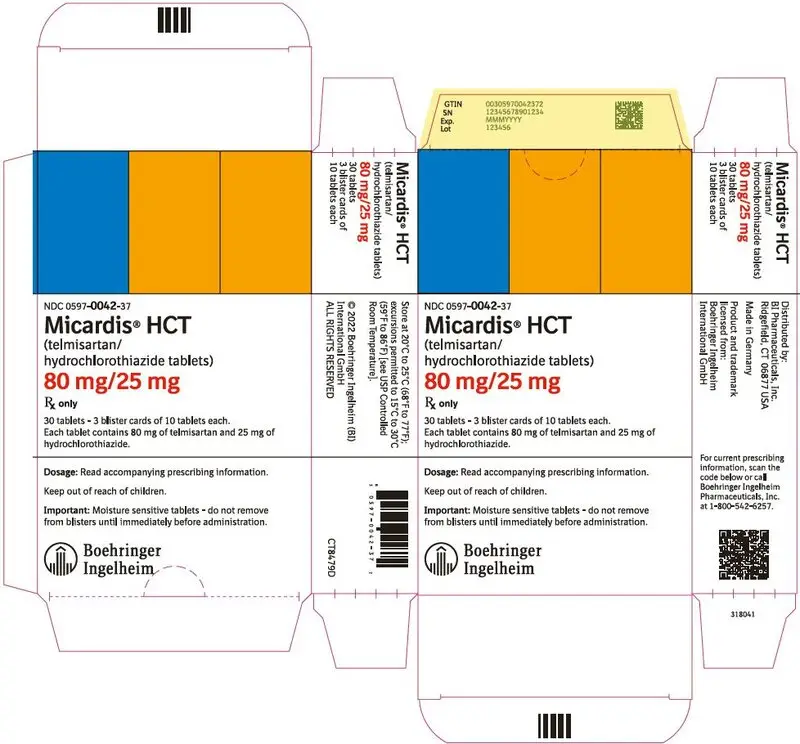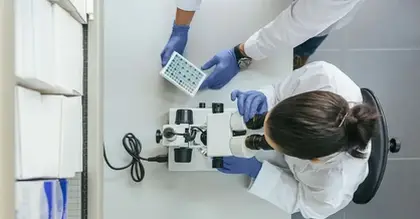Drug Detail:Micardis hct (Hydrochlorothiazide and telmisartan [ hye-droe-klor-oh-thye-a-zide-and-tel-mi-sar-tan ])
Drug Class: Angiotensin II inhibitors with thiazides
Highlights of Prescribing Information
MICARDIS® HCT (telmisartan and hydrochlorothiazide tablets), for oral use
Initial U.S. Approval: 2000
WARNING: FETAL TOXICITY
See full prescribing information for complete boxed warning.
- When pregnancy is detected, discontinue MICARDIS HCT as soon as possible. (5.1, 8.1)
- Drugs that act directly on the renin-angiotensin system can cause injury and death to the developing fetus. (5.1, 8.1)
Indications and Usage for Micardis HCT
- MICARDIS HCT is a combination of an angiotensin II receptor blocker (ARB) and a thiazide diuretic indicated for the treatment of hypertension, alone or with other antihypertensive agents, to lower blood pressure. Lowering blood pressure reduces the risk of fatal and nonfatal cardiovascular events, primarily strokes and myocardial infarctions. (1)
- MICARDIS HCT is not indicated for initial therapy (1)
Micardis HCT Dosage and Administration
- Usual starting dose is 80 mg/12.5 mg once daily (2.1)
- Titrate up to 160 mg/25 mg as needed (2.1)
- Initiate patients with biliary obstructive disorders or hepatic insufficiency at 40 mg/12.5 mg (2.2)
Dosage Forms and Strengths
Tablets: 40 mg/12.5 mg, 80 mg/12.5 mg, 80 mg/25 mg (3)
Contraindications
- Hypersensitivity to telmisartan or any component (4)
- Anuria (4)
- Co-Administration with aliskiren in patients with diabetes (4)
Warnings and Precautions
- Avoid fetal or neonatal exposure (5.1)
- Correct volume or salt depletion before initiating therapy. Observe for signs and symptoms of hypotension. (5.2)
- Monitor renal function and potassium in susceptible patients (5.3)
- Observe for clinical signs of fluid or electrolyte imbalance (5.4)
- Hypersensitivity Reaction (5.5)
- Acute Myopia and Secondary Angle-Closure Glaucoma (5.6)
Adverse Reactions/Side Effects
The most common adverse reactions (≥2% of patients) were upper respiratory tract infection, dizziness, sinusitis, diarrhea, fatigue, influenza-like symptoms, and nausea (6.1)
To report SUSPECTED ADVERSE REACTIONS, contact Boehringer Ingelheim Pharmaceuticals, Inc. at (800) 542-6257 or FDA at 1-800-FDA-1088 or www.fda.gov/medwatch.
Drug Interactions
- Lithium: Risk of lithium toxicity (7.2)
- Non-steroidal anti-inflammatory drugs (NSAIDs): Reduced diuretic, natriuretic, and antihypertensive effects; increased risk of renal impairment (7.3)
- Dual blockade of renin-angiotensin system: Increased risk of renal impairment, hypotension, and hyperkalemia (7.4)
- Antidiabetic drugs: Dosage adjustment may be required (7.6)
- Cholestyramine and colestipol: Reduced absorption of thiazides (7.7)
Use In Specific Populations
- Lactation: Do not breastfeed during treatment with MICARDIS HCT (8.2)
- Severe Hepatic Impairment: Use not recommended (8.6)
- Severe Renal Impairment: Use not recommended (8.7)
See 17 for PATIENT COUNSELING INFORMATION and FDA-approved patient labeling.
Revised: 12/2022
Related/similar drugs
amlodipine, lisinopril, metoprolol, losartan, furosemide, hydrochlorothiazideFull Prescribing Information
WARNING: FETAL TOXICITY
- When pregnancy is detected, discontinue MICARDIS HCT as soon as possible [see Warnings and Precautions (5.1) and Use in Specific Populations (8.1)].
- Drugs that act directly on the renin-angiotensin system can cause injury and death to the developing fetus [see Warnings and Precautions (5.1) and Use in Specific Populations (8.1)].
1. Indications and Usage for Micardis HCT
MICARDIS HCT (telmisartan and hydrochlorothiazide) is indicated for the treatment of hypertension, to lower blood pressure. Lowering blood pressure reduces the risk of fatal and nonfatal cardiovascular events, primarily strokes and myocardial infarctions. These benefits have been seen in controlled trials of antihypertensive drugs from a wide variety of pharmacologic classes including the classes to which this drug principally belongs. There are no controlled trials demonstrating risk reduction with MICARDIS HCT.
Control of high blood pressure should be part of comprehensive cardiovascular risk management, including, as appropriate, lipid control, diabetes management, antithrombotic therapy, smoking cessation, exercise, and limited sodium intake. Many patients will require more than one drug to achieve blood pressure goals. For specific advice on goals and management, see published guidelines, such as those of the National High Blood Pressure Education Program's Joint National Committee on Prevention, Detection, Evaluation, and Treatment of High Blood Pressure (JNC).
Numerous antihypertensive drugs, from a variety of pharmacologic classes and with different mechanisms of action, have been shown in randomized controlled trials to reduce cardiovascular morbidity and mortality, and it can be concluded that it is blood pressure reduction, and not some other pharmacologic property of the drugs, that is largely responsible for those benefits. The largest and most consistent cardiovascular outcome benefit has been a reduction in the risk of stroke, but reductions in myocardial infarction and cardiovascular mortality also have been seen regularly.
Elevated systolic or diastolic pressure causes increased cardiovascular risk, and the absolute risk increase per mmHg is greater at higher blood pressures, so that even modest reductions of severe hypertension can provide substantial benefit. Relative risk reduction from blood pressure reduction is similar across populations with varying absolute risk, so the absolute benefit is greater in patients who are at higher risk independent of their hypertension (for example, patients with diabetes or hyperlipidemia), and such patients would be expected to benefit from more aggressive treatment to a lower blood pressure goal.
Some antihypertensive drugs have smaller blood pressure effects (as monotherapy) in black patients, and many antihypertensive drugs have additional approved indications and effects (e.g., on angina, heart failure, or diabetic kidney disease). These considerations may guide selection of therapy [see Clinical Studies (14)].
MICARDIS HCT is not indicated for initial therapy for the treatment of hypertension [see Dosage and Administration (2.1)].
MICARDIS HCT may be used alone or in combination with other antihypertensive agents.
2. Micardis HCT Dosage and Administration
2.1 Dosing Information
Initiate a patient whose blood pressure is not adequately controlled with telmisartan monotherapy 80 mg on MICARDIS HCT, 80 mg/12.5 mg orally once daily. Dose can be titrated up to 160 mg/25 mg after 2 to 4 weeks, if necessary.
Initiate a patient whose blood pressure is not adequately controlled by 25 mg once daily of hydrochlorothiazide, or is controlled but who experiences hypokalemia with this regimen on MICARDIS HCT 80 mg/12.5 mg once daily. Dose can be titrated up to 160 mg/25 mg after 2 to 4 weeks, if necessary.
Patients titrated to the individual components (telmisartan and hydrochlorothiazide) may instead receive the corresponding dose of MICARDIS HCT.
MICARDIS HCT may be administered with other antihypertensive drugs.
2.2 Dose Adjustment for Hepatic Impairment
Initiate patients with biliary obstructive disorders or hepatic insufficiency under close medical supervision using the 40 mg/12.5 mg combination. MICARDIS HCT tablets are not recommended for patients with severe hepatic impairment [see Use in Specific Populations (8.6) and Clinical Pharmacology (12.3)].
3. Dosage Forms and Strengths
- 40 mg/12.5 mg, red and white tablets marked with the Boehringer Ingelheim logo and "H4"
- 80 mg/12.5 mg, red and white tablets marked with the Boehringer Ingelheim logo and "H8"
- 80 mg/25 mg, yellow and white tablets marked with the Boehringer Ingelheim logo and "H9"
4. Contraindications
MICARDIS HCT is contraindicated:
- In patients who are hypersensitive to any component of this product [see Warnings and Precautions (5.5)].
- In patients with anuria.
- For co-administration with aliskiren in patients with diabetes [see Drug Interactions (7.4)].
5. Warnings and Precautions
5.2 Hypotension in Volume- or Salt-Depleted Patients
In patients with an activated renin-angiotensin system, such as volume- or salt-depleted patients (e.g., those being treated with high doses of diuretics), symptomatic hypotension may occur after initialization of treatment with MICARDIS HCT. Correct volume or salt depletion prior to administration of MICARDIS HCT.
5.3 Impaired Renal Function
Changes in renal function including acute renal failure can be caused by drugs that inhibit the renin-angiotensin system and by diuretics. Patients whose renal function may depend in part on the activity of the renin-angiotensin system (e.g., patients with renal artery stenosis, chronic kidney disease, severe congestive heart failure, or volume depletion) may be at particular risk of developing oliguria, progressive azotemia, or acute renal failure on MICARDIS HCT. Monitor renal function periodically in these patients. Consider withholding or discontinuing therapy in patients who develop a clinically significant decrease in renal function on MICARDIS HCT.
5.4 Electrolytes and Metabolic Disorders
Drugs, including telmisartan, that inhibit the renin-angiotensin system can cause hyperkalemia, particularly in patients with renal insufficiency, diabetes, or combination use with other angiotensin receptor blockers or ACE inhibitors and the concomitant use of other drugs that raise serum potassium levels [see Drug Interactions (7.1, 7.4)].
Hydrochlorothiazide can cause hypokalemia and hyponatremia. Thiazides have been shown to increase the urinary excretion of magnesium; this may result in hypomagnesemia. Hypomagnesemia can result in hypokalemia which may be difficult to treat despite potassium repletion. Monitor serum electrolytes periodically.
In controlled trials using the telmisartan/hydrochlorothiazide combination treatment, no patient administered 40 mg/12.5 mg, 80 mg/12.5 mg, or 80 mg/25 mg experienced a decrease in potassium ≥1.4 mEq/L, and no patient experienced hyperkalemia.
Hydrochlorothiazide decreases urinary calcium excretion and may cause elevations of serum calcium.
Hydrochlorothiazide may alter glucose tolerance and raise serum levels of cholesterol and triglycerides.
Hyperuricemia may occur or frank gout may be precipitated in certain patients receiving thiazide therapy. Because telmisartan decreases uric acid, telmisartan in combination with hydrochlorothiazide attenuates the diuretic-induced hyperuricemia.
5.6 Acute Myopia and Secondary Angle-Closure Glaucoma
Hydrochlorothiazide, a sulfonamide, can cause an idiosyncratic reaction, resulting in acute transient myopia and acute angle-closure glaucoma. Symptoms include acute onset of decreased visual acuity or ocular pain and typically occur within hours to weeks of drug initiation. Untreated acute angle-closure glaucoma can lead to permanent vision loss. The primary treatment is to discontinue hydrochlorothiazide as rapidly as possible. Prompt medical or surgical treatments may need to be considered if the intraocular pressure remains uncontrolled. Risk factors for developing acute angle-closure glaucoma may include a history of sulfonamide or penicillin allergy.
6. Adverse Reactions/Side Effects
The following adverse reactions are discussed elsewhere in labeling:
- Hypotension [see Warnings and Precautions (5.2)]
- Renal Impairment [see Warnings and Precautions (5.3)]
- Electrolytes and Metabolic Disorders [see Warnings and Precautions (5.4)]
6.1 Clinical Trials Experience
Because clinical studies are conducted under widely varying conditions, adverse reaction rates observed in the clinical studies of a drug cannot be directly compared to rates in the clinical studies of another drug and may not reflect the rates observed in practice.
MICARDIS HCT has been evaluated for safety in more than 1700 patients, including 716 treated for hypertension for longer than 6 months and 420 for more than 1 year. Adverse reactions have been limited to those that have been previously reported with telmisartan and/or hydrochlorothiazide.
Adverse reactions occurring at an incidence of ≥2% in patients treated with telmisartan/hydrochlorothiazide and at a greater rate than in patients treated with placebo, are presented in Table 1 [see Clinical Studies (14)].
| * includes all doses of telmisartan (20 to 160 mg), hydrochlorothiazide (6.25 to 25 mg), and combinations thereof | ||||
| Telmisartan/Hydrochlorothiazide (n = 414) | Placebo (n = 74) | Telmisartan (n = 209) | Hydrochlorothiazide (n = 121) |
|
| Body as a whole | ||||
| Fatigue | 3% | 1% | 3% | 3% |
| Influenza-like symptoms | 2% | 1% | 2% | 3% |
| Central/Peripheral nervous system
Dizziness | 5% | 1% | 4% | 6% |
| Gastrointestinal system | ||||
| Diarrhea | 3% | 0% | 5% | 2% |
| Nausea | 2% | 0% | 1% | 2% |
| Respiratory system disorder
Sinusitis | 4% | 3% | 3% | 6% |
| Upper respiratory tract infection | 8% | 7% | 7% | 10% |
Other adverse reactions observed for telmisartan/hydrochlorothiazide were: pain (including back and abdominal), dyspepsia, erythema, vomiting, bronchitis, and pharyngitis.
Adverse reactions occurred at approximately the same rates in men and women, older and younger patients, and black and non-black patients.
6.2 Postmarketing Experience
The following adverse reactions have been identified during post-approval use of MICARDIS HCT. Because these reactions are reported voluntarily from a population of uncertain size, it is not always possible to estimate reliably their frequency or establish a causal relationship to drug exposure.
Blood and Lymphatic System Disorders: Eosinophilia
Cardiac Disorders: Tachycardia
Ear and Labyrinth Disorders: Vertigo
General Disorders and Administration Site Conditions: Asthenia, edema
Hepato-biliary: Abnormal hepatic function/liver disorder
Immune System Disorders: Anaphylactic reaction
Investigations: Increased CPK
Metabolism and Nutrition Disorders: Hypoglycemia (in diabetic patients), hyponatremia
Musculoskeletal and Connective Tissue Disorders: Rhabdomyolysis
Nervous System Disorders: Headache, syncope
Renal and Urinary Disorders: Renal failure, renal impairment including acute renal failure
Reproductive System and Breast Disorders: Erectile dysfunction
Respiratory, Thoracic and Mediastinal Disorders: Coughing
Skin and Subcutaneous Tissue Disorders: Angioedema (with fatal outcome), drug eruption (toxic skin eruption mostly reported as toxicoderma, rash, and urticaria)
Vascular Disorder: Orthostatic hypotension
7. Drug Interactions
7.1 Agents Increasing Serum Potassium
Co-administration of telmisartan with other drugs that raise serum potassium levels may result in hyperkalemia. Monitor serum potassium in such patients.
7.2 Lithium
Increases in serum lithium concentrations and lithium toxicity have been reported with concomitant use of thiazide diuretics or angiotensin II receptor antagonists, including telmisartan. Monitor lithium levels in patients receiving MICARDIS HCT and lithium.
7.3 Non-Steroidal Anti-Inflammatory Agents including Selective Cyclooxygenase-2 Inhibitors
7.4 Dual Blockade of the Renin-Angiotensin-Aldosterone System and Changes in Renal Function
Dual blockade of the renin-angiotensin-aldosterone system (RAS) with angiotensin blockers, ACE inhibitors, or aliskiren is associated with increased risks of hypotension, hyperkalemia, and renal impairment. The ONTARGET trial enrolled 25,620 patients ≥55 years old with atherosclerotic disease or diabetes with end-organ damage, randomizing them to telmisartan (ARB) only, ramipril (ACE inhibitor) only, or the combination, and followed them for a median of 56 months. Patients who received the combination of ARB and ACE inhibitor did not obtain any additional benefit (no additional reduction of risk of cardiovascular death, myocardial infarction, stroke, or hospitalization from heart failure) compared to ARB monotherapy or ACE inhibitor monotherapy, but experienced an increased incidence of renal dysfunction (e.g., acute renal failure) compared with monotherapy groups.
In general, avoid combined use of RAS inhibitors. Closely monitor blood pressure, renal function and electrolytes in patients on MICARDIS HCT and other agents that affect the RAS.
Do not co-administer aliskiren with MICARDIS HCT in patients with diabetes. Avoid concomitant use of aliskiren with MICARDIS HCT in patients with renal impairment (GFR <60 mL/min/1.73 m2).
7.5 Digoxin
When telmisartan was co-administered with digoxin, median increases in digoxin peak plasma concentration (49%) and in trough concentration (20%) were observed. Monitor digoxin levels in patients taking concomitant MICARDIS HCT and digoxin.
7.6 Antidiabetic Drugs (Oral Agents and Insulin)
Dosage adjustment of antidiabetic drugs may be required when co-administered with hydrochlorothiazide.
7.7 Cholestyramine and Colestipol Resins
Absorption of hydrochlorothiazide is impaired in the presence of anionic exchange resins. Stagger the dosage of hydrochlorothiazide and the resin such that hydrochlorothiazide is administered at least 4 hours before or 4 to 6 hours after the administration of the resin.
8. Use In Specific Populations
8.4 Pediatric Use
Safety and effectiveness of MICARDIS HCT in pediatric patients have not been established.
8.5 Geriatric Use
In the controlled clinical trials (n=1017), approximately 20% of patients treated with telmisartan/hydrochlorothiazide were 65 years of age or older, and 5% were 75 years of age or older. No overall differences in effectiveness and safety of telmisartan/hydrochlorothiazide were observed in these patients compared to younger patients. Other reported clinical experience has not identified differences in responses between the elderly and younger patients, but greater sensitivity of some older individuals cannot be ruled out. In general, dose selection for an elderly patient should be cautious, usually starting at the low end of the dosing range, reflecting the greater frequency of decreased hepatic, renal or cardiac function and of concomitant diseases or other drug therapy.
8.6 Use in Patients with Hepatic Impairment
Patients with biliary obstructive disorders or hepatic insufficiency should initiate treatment under close medical supervision using the 40 mg/12.5 mg combination.
8.7 Use in Patients with Renal Impairment
Safety and effectiveness of MICARDIS HCT in patients with severe renal impairment (CrCl ≤30 mL/min) have not been established. In patients with severe renal impairment, MICARDIS HCT tablets are not recommended. No dose adjustment is required in patients with mild (CrCl 60 to 90 mL/min) or moderate (CrCl 30 to 60 mL/min) renal impairment.
11. Micardis HCT Description
MICARDIS HCT tablets are a combination of telmisartan, an orally active angiotensin II antagonist acting on the AT1 receptor subtype, and hydrochlorothiazide, a thiazide diuretic.
Telmisartan, a non-peptide molecule, is chemically described as 4'-[(1,4'-dimethyl-2'-propyl[2,6'-bi-1H-benzimidazol]-1'-yl)methyl]-[1,1'-biphenyl]-2-carboxylic acid. Its empirical formula is C33H30N4O2, its molecular weight is 514.63, and its structural formula is:
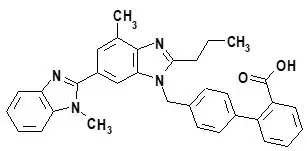
Telmisartan is a white to slightly yellowish solid. It is practically insoluble in water and in the pH range of 3 to 9, sparingly soluble in strong acid (except insoluble in hydrochloric acid), and soluble in strong base.
Hydrochlorothiazide is a white, or practically white, practically odorless, crystalline powder with a molecular weight of 297.74. It is slightly soluble in water, and freely soluble in sodium hydroxide solution. Hydrochlorothiazide is chemically described as 6-chloro-3,4-dihydro-2H-1,2,4-benzothiadiazine-7-sulfonamide 1,1-dioxide. Its empirical formula is C7H8ClN3O4S2, and its structural formula is:
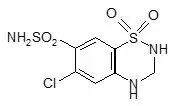
MICARDIS HCT tablets are formulated for oral administration in three combinations of 40 mg/12.5 mg, 80 mg/12.5 mg, and 80 mg/25 mg telmisartan and hydrochlorothiazide, respectively. The tablets contain the following inactive ingredients: sodium hydroxide, meglumine, povidone, sorbitol, magnesium stearate, lactose monohydrate, microcrystalline cellulose, maize starch, and sodium starch glycolate. As coloring agents, the 40 mg/12.5 mg and 80 mg/12.5 mg tablets contain ferric oxide red, and the 80 mg/25 mg tablets contain ferric oxide yellow. MICARDIS HCT tablets are hygroscopic and require protection from moisture.
12. Micardis HCT - Clinical Pharmacology
16. How is Micardis HCT supplied
MICARDIS HCT is available in three strengths as biconvex two-layered, oblong-shaped, uncoated tablets containing telmisartan and hydrochlorothiazide:
- 40 mg/12.5 mg tablet: red and white (may contain red specks) marked with the Boehringer Ingelheim company symbol and "H4"; individually blister-sealed in cartons of 30 tablets as 3 × 10 cards (NDC 0597-0043-37)
- 80 mg/12.5 mg tablet: red and white (may contain red specks) marked with the Boehringer Ingelheim company symbol and "H8"; individually blister-sealed in cartons of 30 tablets as 3 × 10 cards (NDC 0597-0044-37)
- 80 mg/25 mg tablet: yellow and white (may contain yellow specks) marked with the Boehringer Ingelheim company symbol and "H9"; individually blister-sealed in cartons of 30 tablets as 3 × 10 cards (NDC 0597-0042-37)
17. Patient Counseling Information
Advise the patient to read the FDA-approved patient labeling (Patient Information).
Patient InformationMICARDIS® HCT (my-CAR-dis HCT)(telmisartan and hydrochlorothiazide tablets)
Read this Patient Information before you start taking MICARDIS HCT tablets and each time you get a refill. There may be new information. This information does not take the place of talking to your doctor about your medical condition or your treatment.
What is the most important information I should know about MICARDIS HCT tablets?
MICARDIS HCT can cause harm or death to an unborn baby. Talk to your doctor about other ways to lower your blood pressure if you plan to become pregnant. If you get pregnant while taking MICARDIS HCT, tell your doctor right away.
What is MICARDIS HCT?
MICARDIS HCT is a prescription medicine used to treat high blood pressure (hypertension). MICARDIS HCT contains:
- telmisartan, an angiotensin receptor blocker (ARB)
- hydrochlorothiazide, a water pill or diuretic
Your doctor may prescribe other medicines for you to take along with MICARDIS HCT to treat your high blood pressure.
It is not known if MICARDIS HCT is safe and effective in children.
Do not take MICARDIS HCT tablets if you:
- have low or no urine output
- are allergic (hypersensitive) to the active ingredients (telmisartan or hydrochlorothiazide) or any of the other ingredients listed at the end of this leaflet
What should I tell my doctor before using MICARDIS HCT tablets?
Before you take MICARDIS HCT tablets, tell your doctor if you:
- are pregnant or are planning to become pregnant. See "What is the most important information I should know about MICARDIS HCT tablets?"
- are breast-feeding or plan to breast-feed. MICARDIS HCT can pass into your breast milk and may harm your baby. You and your doctor should decide if you will take MICARDIS HCT or breast-feed. You should not do both. Talk with your doctor about the best way to feed your baby if you take MICARDIS HCT tablets.
- have been told that you have abnormal body salt (electrolytes) levels in your blood
- have liver problems
- have asthma or history of asthma
- have lupus
- have diabetes
- have kidney problems
- have any other medical conditions
Tell your doctor about all the medicines you take, including prescription and non-prescription medicines, vitamins, and herbal supplements. Also, tell your doctor if you drink alcohol.
MICARDIS HCT may affect the way other medicines work, and other medicines may affect how MICARDIS HCT works. Especially tell your doctor if you take:
- aliskiren
- digoxin (Lanoxin®)
- lithium (Lithobid®, lithium carbonate, lithium citrate)
- other medicines used to treat your high blood pressure or a heart problem
- water pills (diuretic)
- aspirin or other non-steroidal anti-inflammatory drugs (NSAIDs)
- potassium supplements or a salt substitute containing potassium
- medicine used to treat diabetes, including insulin
- narcotic pain medicines
- sleeping pills
- steroid medicine or Adrenocorticotrophic Hormone (ACTH)
- barbiturates
- certain cholesterol lowering medicines (resins that are used for cholesterol reduction, e.g., cholestyramine and colestipol resins)
Ask your doctor if you are not sure if you are taking one of the medicines listed above.
Know the medicines you take. Keep a list of them and show it to your doctor or pharmacist when you get a new medicine.
How should I take MICARDIS HCT tablets?
- Take MICARDIS HCT tablets exactly as your doctor tells you to take it.
- Your doctor will tell you how much MICARDIS HCT to take and when to take it.
- Do not change your dose unless your doctor tells you to.
- Take MICARDIS HCT once each day.
- Take MICARDIS HCT tablets with or without food.
- If you take too much MICARDIS HCT, call your doctor, or go to the nearest hospital emergency room right away.
- Read the "How to open the blister" at the end of this leaflet before you use MICARDIS HCT. Talk with your doctor if you do not understand the instructions.
What are the possible side effects of MICARDIS HCT tablets?
MICARDIS HCT tablets may cause serious side effects, including:
- Injury or death to your unborn baby. See "What is the most important information I should know about MICARDIS HCT tablets?"
-
Low blood pressure (hypotension) is most likely to happen if you also:
- take water pills (diuretics)
- are on a low-salt diet
- get dialysis treatments
- have heart problems
- get sick with vomiting or diarrhea
- do not drink enough fluids
- sweat a lot
-
Kidney problems, which may get worse if you already have kidney disease. You may have changes in your kidney test results, and you may need a lower dose of MICARDIS HCT tablets. Call your doctor if you get:
- swelling in your feet, ankles, or hands
- unexplained weight gain
- Liver problems, which may get worse in people who already have liver problems and take MICARDIS HCT.
-
Eye problems. One of the medicines in MICARDIS HCT can cause eye problems that may lead to vision loss. Symptoms of eye problems can happen within hours to weeks of starting MICARDIS HCT. Tell your doctor right away if you have:
- decrease in vision
- eye pain
-
Allergic reactions. Tell your doctor right away if you get any of these symptoms:
- swelling of the face, tongue, throat
- difficulty breathing
- Worsening of lupus. Tell your doctor if your lupus gets worse or becomes active while taking MICARDIS HCT.
- Change in body salts (electrolytes) level in your blood and fluid problems. Your doctor may do tests to check your blood. Call your doctor right away if you have:
|
|
- Skin Cancer. One of the medicines in MICARDIS HCT may increase your risk of getting non-melanoma skin cancer. Protect your skin from the sun and undergo regular skin cancer screening when taking MICARDIS HCT.
The most common side effects of MICARDIS HCT tablets include:
- upper respiratory tract infections, including sinus pain/congestion and sore throat
- dizziness
- feeling tired
- flu-like symptoms
- back pain
- diarrhea
- nausea
These are not all the possible side effects with MICARDIS HCT tablets. Tell your doctor if you have any side effect that bothers you or that does not go away. Call your doctor for medical advice about side effects. You may report side effects to FDA at 1-800-FDA-1088.
How should I store MICARDIS HCT tablets?
- Store MICARDIS HCT tablets at room temperature between 68°F to 77°F (20°C to 25°C).
- Do not remove MICARDIS HCT tablets from blisters until right before you take them.
Keep MICARDIS HCT tablets and all medicines out of the reach of children.
General information about MICARDIS HCT tablets:
Medicines are sometimes prescribed for purposes other than those listed in a Patient Information leaflet. Do not use MICARDIS HCT tablets for a condition for which it was not prescribed. Do not give MICARDIS HCT tablets to other people, even if they have the same condition you have. It may harm them.
This Patient Information leaflet summarizes the most important information about MICARDIS HCT tablets. If you would like more information, talk with your doctor. You can ask your pharmacist or doctor for information about MICARDIS HCT tablets that is written for health professionals.
For current prescribing information, scan the code or call Boehringer Ingelheim Pharmaceuticals, Inc. at 1-800-542-6257.

What are the ingredients in MICARDIS HCT tablets?
Active Ingredients: telmisartan and hydrochlorothiazide
Inactive Ingredients: sodium hydroxide, meglumine, povidone, sorbitol, magnesium stearate, lactose monohydrate, microcrystalline cellulose, maize starch, and sodium starch glycolate
The 40 mg/12.5 mg and 80 mg/12.5 mg tablets also contain: ferric oxide red.
The 80 mg/25 mg tablets also contain: ferric oxide yellow.
What is high blood pressure (hypertension)?
Blood pressure is the force in your blood vessels when your heart beats and when your heart rests. You have high blood pressure when the force is too much. Medicines that lower your blood pressure lower your chance of having a stroke or heart attack.
High blood pressure makes the heart work harder to pump blood through the body and causes damage to the blood vessels. MICARDIS HCT tablets can help your blood vessels relax so your blood pressure is lower.
How to open the blister:
- Tear (You may also use scissors to tear the blister apart)
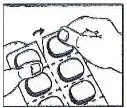
- Peel (Peel off the paper layer from the aluminum foil)

- Push (Push the tablet through the aluminum foil)
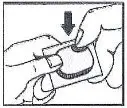
This Patient Information has been approved by the U.S. Food and Drug Administration.
Distributed by:
Boehringer Ingelheim Pharmaceuticals, Inc.
Ridgefield, CT 06877 USA
Licensed from:
Boehringer Ingelheim International GmbH
Ingelheim, Germany
MICARDIS® is a registered trademark of and used under license from Boehringer Ingelheim International GmbH.
Boehringer Ingelheim Pharmaceuticals, Inc. either owns or uses the ONTARGET® trademark under license.
The other brands listed are trademarks of their respective owners and are not trademarks of Boehringer Ingelheim Pharmaceuticals, Inc.
Revised: December 2022
COL10674AL272022
SPL10694A
| MICARDIS HCT
telmisartan and hydrochlorothiazide tablet |
||||||||||||||||||||
|
||||||||||||||||||||
|
||||||||||||||||||||
|
||||||||||||||||||||
|
||||||||||||||||||||
|
||||||||||||||||||||
| MICARDIS HCT
telmisartan and hydrochlorothiazide tablet |
||||||||||||||||||||
|
||||||||||||||||||||
|
||||||||||||||||||||
|
||||||||||||||||||||
|
||||||||||||||||||||
|
||||||||||||||||||||
| MICARDIS HCT
telmisartan and hydrochlorothiazide tablet |
||||||||||||||||||||
|
||||||||||||||||||||
|
||||||||||||||||||||
|
||||||||||||||||||||
|
||||||||||||||||||||
|
||||||||||||||||||||
| Labeler - Boehringer Ingelheim Pharmaceuticals, Inc. (603175944) |
| Registrant - Boehringer Ingelheim Pharmaceuticals, Inc. (603175944) |
| Establishment | |||
| Name | Address | ID/FEI | Business Operations |
|---|---|---|---|
| Boehringer Ingelheim Pharma GmbH and Co. KG | 551147440 | MANUFACTURE(0597-0042, 0597-0043, 0597-0044) , API MANUFACTURE(0597-0042, 0597-0043, 0597-0044) | |
| Establishment | |||
| Name | Address | ID/FEI | Business Operations |
|---|---|---|---|
| West-Ward Columbus Inc. | 058839929 | PACK(0597-0042, 0597-0043, 0597-0044) , LABEL(0597-0042, 0597-0043, 0597-0044) , MANUFACTURE(0597-0042, 0597-0043, 0597-0044) | |
| Establishment | |||
| Name | Address | ID/FEI | Business Operations |
|---|---|---|---|
| Rottendorf Pharma GmbH | 315974691 | MANUFACTURE(0597-0042, 0597-0043, 0597-0044) , PACK(0597-0042, 0597-0043, 0597-0044) , LABEL(0597-0042, 0597-0043, 0597-0044) | |
| Establishment | |||
| Name | Address | ID/FEI | Business Operations |
|---|---|---|---|
| Boehringer Ingelheim Promeco S.A. de C.V. | 812579472 | PACK(0597-0042, 0597-0043, 0597-0044) , LABEL(0597-0042, 0597-0043, 0597-0044) | |




